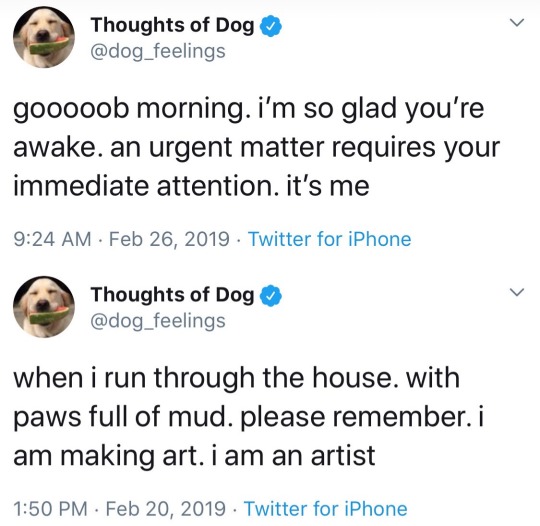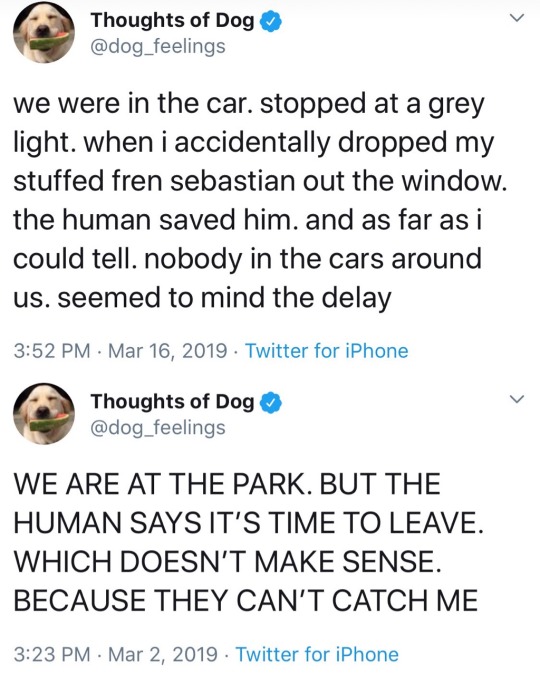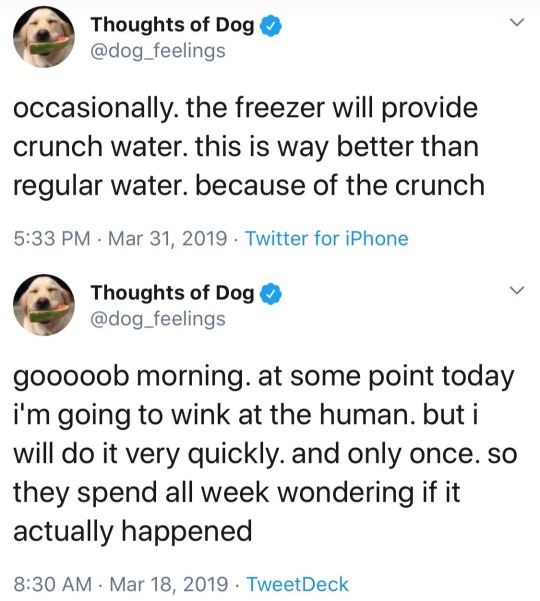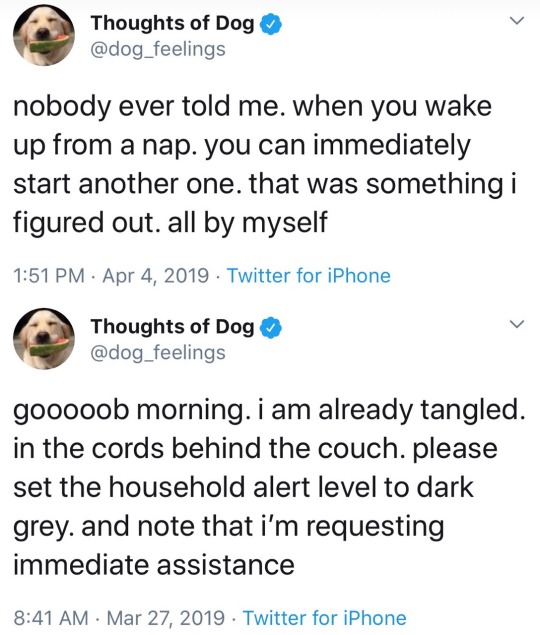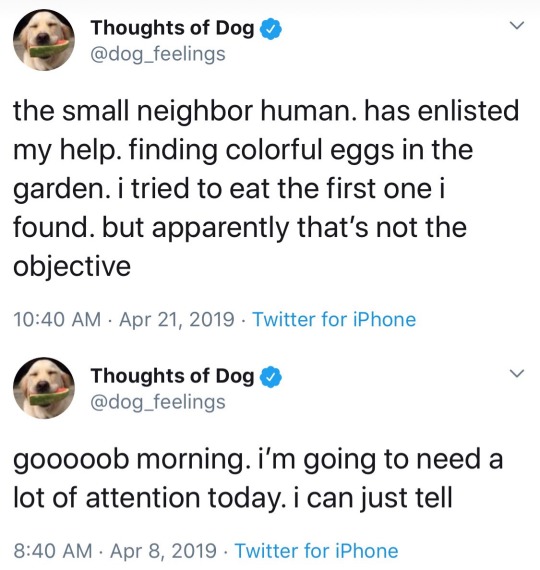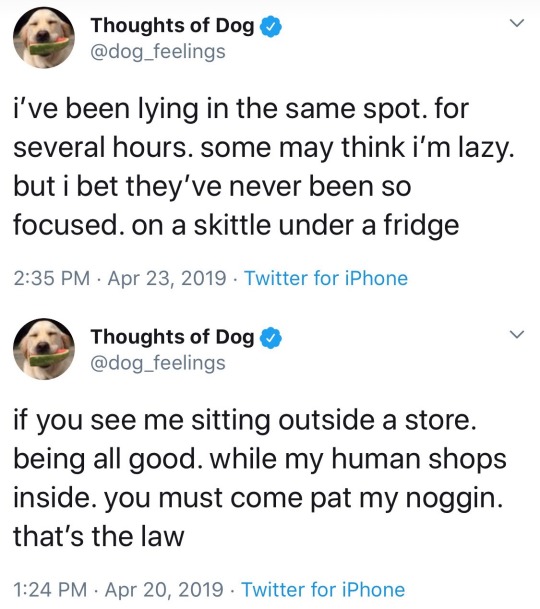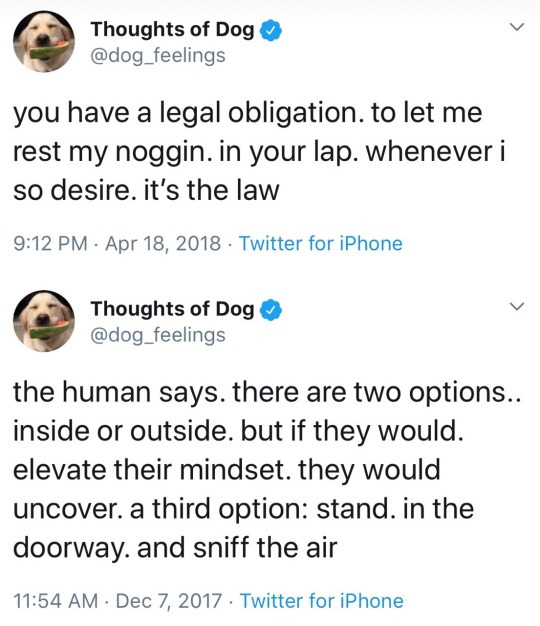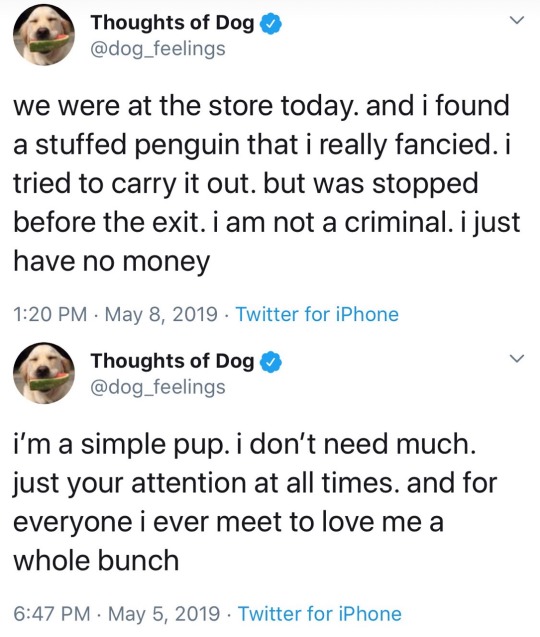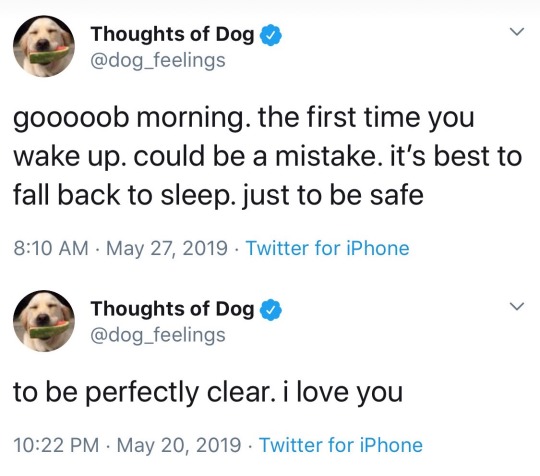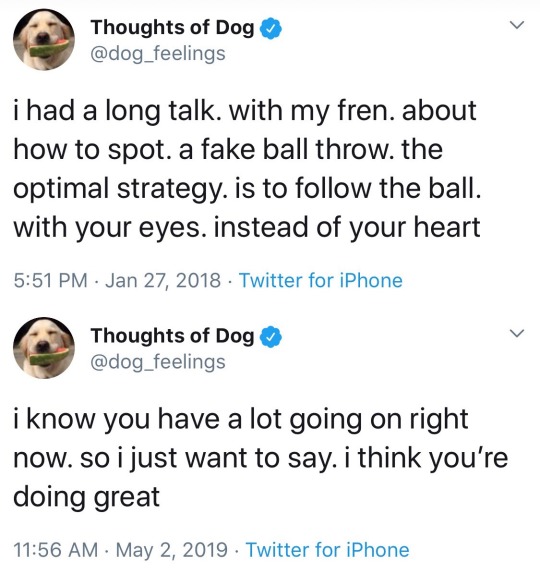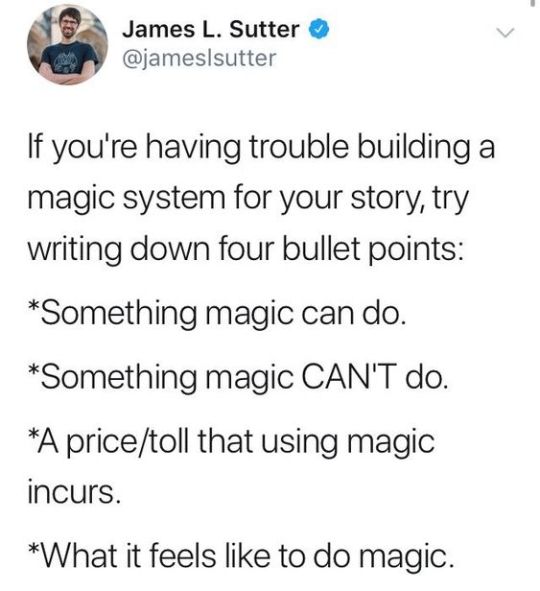Kate will read books. Kate will attempt to write books. Kate will post pictures of books. Also cats.
Don't wanna be here? Send us removal request.
Text
I wonder if, in superhero universes, the villains ever get contacted by those “Make a Wish Foundation” and similar people.
I mean, the heroes do, of course they do, kids who want to meet Spiderman or Superman or get to be carried by the Flash as he runs through Central City for just thirty seconds.
But surely there are also the kids, who - because they are kids and sometimes kids are just weird - decide that what they really, really want is to meet a supervillain. Because he’s scary or she’s awesome or that freeze ray is just really, really cool, you know?
226K notes
·
View notes
Quote
You are enough. you have always been enough.
Rebel Thriver (via onlinecounsellingcollege)
2K notes
·
View notes
Photo

For any new Good Omens fans, I feel that it is very important that you see this photograph of Neil Gaiman and Terry Pratchett.
6K notes
·
View notes
Text
“Nope,” I whisper as I exit out of a fic with no paragraph breaks.
424K notes
·
View notes
Text
I can’t help but feel it is my duty to pass this on.
can’t stop loving
medieval art
90K notes
·
View notes
Text
This may be a stupid question, but I'm having trouble coming up with swear words/exclamatory phrases for fantasy and/or futuristic worlds without religion. Like "oh my god" or "damn it" or "holy sh*t" or "what the hell"... I've no idea how to replace phrases like that with no religious influence, without them sounding cringey and forced. Any advice?
Coming Up with Swear Words in Fantasy
One of the best things you can do is come up with two or three different religions for your story’s world and figure out swear words from there. You don’t have to go really in-depth into developing these religions, but just knowing how many gods they worship, gender of the gods, what the gods are named/called, and what the gods represent can help you figure this out. You can play somewhat off swear phrases in our world, too. Like, maybe one religion has a goddess called “The Sweet Mother.” So maybe a swear phrase could be, “Holy Sweet Mother!” or “Cursed Sweet Mother!” In fantasies where there are religions with multiple gods, “Gods” or “Gods be damned” is a commonly used swear phrase. And again, you could go with things like “Holy Gods!” “Cursed Gods” “Curse the Gods!” “Damn the Gods!” etc. In Game of Thrones, “seven hells” was a popular curse. Many religions have a version of hell, so you could use that or come up with a unique name for your religion’s hell and use that. If you establish that hell in your story’s world is called “Grenedor,” you can do something like “Bloody Grenedor!” or “What in Grenedor is going on here?” and “Damn it all to Grenedor!”
If you don’t want religion to be a part of your story’s world, you can accomplish the same thing using other figures of reverence or importance. “For King Feramon’s sake!” or “Cursed King!” Something like “Sweet Mother of Whores!” or “Cursed Father of Drunkards!” could work. Finally, you can just make up words that sound interesting. Frak was used in Battlestar Galactica while frell was used in Farscape. Mork the alien from the 1980s TV show Mork and Mindy used the word shazbot as a curse word. The TV show Red Dwarf used the word smeg. Here are some words and phrases you can combine with made up words, fictional religious words/elements, or other world elements to create swear phrases: 1. For _____ sake! 2. What the bloody ____? 3. ______ dammit! 4. Holy mother of ______! 5. Bloody _______! 6. Cursed ______! 7. Holy _______! 8. Blasted _____ of _____!
9. Worthless son of a _____!
10. ____ be damned!
I hope that helps!!!
191 notes
·
View notes
Text
Man, language is fun.
how did they learn to translate languages into other languages how did they know which words meant what HOW DID TH
1M notes
·
View notes
Text
World Building #1
Note: this is not intended as a how to guide, this is simply my process (so far), but it may help you with your own projects.
Whenever I start a world building project, I always start with a basic map first. There’s no right or wrong way to start, this is just how I do mine. It makes it much easier for me to figure out how everything works together (weather, environment, currents, travel, mountain ranges etc) when I have a basic idea of how the land looks. The following example is my current project and subject to many changes as things evolve.
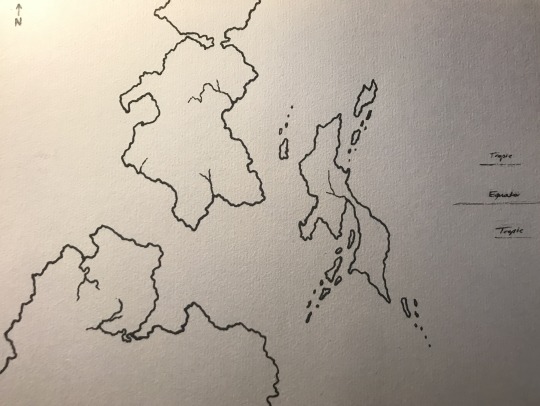
I’m not going to go into how I figure out shapes and all that, it’s not particularly interesting, but importantly (for me), I line in where the equator and tropics would be. From this, we can see where things would logically sit, and I need my world to be logical, let’s blame my years of geographical and geological studies. These areas are the hottest and wettest parts of this world and where you’ll find monsoons and rainforests. Knowing where the rainforests are is a particularly important thing for me with the story involved with this project. I may expand on this in a later post.
Next thing I do is I make lists of things that I would like to figure out about my world. I normally start with the environment, but all I’ve figured out so far is rainforest, and only on the southern continent where the story will be set; that’s all I really need right now. I already have a story idea, and I want to move forward with the people, culture, customs, religion etc. I can figure the rest out later. Without further ado, here is my list of things to consider and build on.
Note: there is a lot of crossover between these sections, I’ve tried to keep to the main subject at hand with the questions asked so it’s not quite as confusing.
Culture
naming conventions (for both people and places) - how do the names work? are children named after their fathers or mothers? other family members? the alignment of the stars? a physical characteristic?
societal structure including hierarchy of class systems and distinctions between them - how different is a poor person from a rich person?
government type and structure - this will have it’s own section further down
housing (architecture, building materials etc) - where and how does this society live? family groups/tribes/cities?
celebrations - which events are celebrated and how (eg births, deaths & marriages)?
festivals and rituals
music, dance & art - what kind of music is listened to? do they dance? what kind of artwork exists in this world/society? are there paintings/sculptures/poetry/songs/musical instruments?
cultural relations - how does this culture think of itself in relation to other cultures? are they better than the next country/town over? are they proud of their achievements or jealous of those of others?
marriage/partnerships - do people get married? is there a ritual involved?
gender roles and sexuality - are there distinctions between genders? will one be shunned from society for not fitting the social norm?
clothing - what do people wear? what is their clothing made of? does it reflect their job or class?
jobs and employment - which jobs are required for this society to function? which are the best and worst jobs?
monetary system/trade - does this society have money? how much is it worth? is it a bartering society? both?
education - are there schools? are there class requirements to attend? how much do they learn? is this a literate society? what is the age range of students?
games, sports and recreation - what do people do for fun? what games do they play? how do children entertain themselves? is there a professional sports league?
food - what food do they eat? are they a predominantly vegetarian society? are they cannibals? do they only eat fish every second weekday? what is the standard fare? are meals eaten in public? with family only?
communal projects - when a house or temple needs to be built, does the community come together? are there monuments? who builds these things? who is in charge of organising them?
military/police force - are there either in this society? is it voluntary? is there a draft? how exactly do they use/abuse their power within this society?
Religion
importance - how important is religion to this society? to what extent does the population share beliefs?
origin story - is there one? how does this society believe the world/universe/god/s came to be?
end of times - what does society believe will happen? is there fire? does the sun explode? a meteor land on a god’s head who then takes his rage out on the planet? does society even care or think about it? will it really happen?
mythology - what are the myths prevalent in this society? do they have any religious beliefs at all?
deity - which god/s does this society worship/believe in?
astrology - do the stars have any power over events in this world? does society believe they do?
afterlife - is there an afterlife? what does this society believe happens when they die? is there a heaven/hell? are there any funerary rites/rituals? do they bury, burn or send their dead off to sea? are there cemeteries?
soul - what does society think the soul is? do they even think about these things? do they believe in soul damage? do their actions affect their souls? are souls reincarnated?
temples/places of worship - how big/important are they? are they any at all? is religion practiced in the privacy of one’s own home? is it compulsory to attend services? are there certain trees which are revered? which gods do they worship? does each deity have their own separate place of worship?
hierarchy - who is running the temples or places of worship? who maintains the properties? how important are priests or their equivalent? who are they in charge of?
festivals - are there any religious festivals practiced in this society? what are the rules? is there a costume or dress-code?
religious texts - is there a bible/koran/book of the dead-type volume? how available is it? does every follower have a copy? do they only know the parts that have been read to them?
prophesies - is there a person who has visions? are they seen as a madman, prophet, or just gifted? do these prophesies come true? are they believed to come true? are they written down, inscribed on temple walls or just passed on through word of mouth?
food - is there any religious influence on what food is forbidden or encouraged? what are the restrictions? when can certain foods be eaten?
magic - is there any magic that is received only from a deity? what kind of magic do deities have? what kind of magic do/can they bestow on their subjects?
Science, Magic & Technology
technology - what kind of technology is available to this society? do they have electricity? is everything steam/wind/water/kinetic powered? does magic make the world go round? are there machines? what are they capable of?
astronomy - does society think their planet is the centre of the universe? what do they know about the stars? do they believe the stars are souls of the dead? the gods looking down on them? do they have telescopes?
calendars/clocks - how is time measured? is it just a block of seasons? do they measure days/weeks/months? do they measure years scientifically through various measures such as astronomy or just at the end of each winter/summer? do they have clocks? sundials? does magic tell them how much time has passed? do the gods?
medicine - what medicine is available? which diseases can be cured and which are incurable? or is it just magic? are doctors/healers trained on the job or in a university-type situation? do they serve an apprenticeship to someone experienced? are there hospitals or medicine women? both?
healthcare (tying back into medicine) - is there a healthcare system? do people pay for healing? are the poor excluded from it? are there doctors/healers who work on a pro bono system? is it free for anyone to receive healthcare?
writing - does this society have a written language? is it hard to learn? how many people are able to read/write? is their written language different from their spoken language? ie English scholars who wrote in Latin.
messages/communication - how are messages transmitted between two people with distance between them? do they write letters? use a mirror? carrier pigeons? is there a postal service? are messages written on paper/slate/stone/leaves? what do they use to write letters with? do they simply send messages via telepathy?
metals - which metals are available? what are these metals used for? how skilled are the metal workers? where is this material mined from? does it just lie on the ground around the place? is it only found in streams on a sunny day? how is this metal transported from it’s resting place to the smithy? who mines it? are there surveyors? do you need to be specially trained to find/work it?
weapons - are weapons commonplace? what kind of weapons are available? how expensive are they? are they only available to the military or the wealthy?
paper - is it available? how common is it? is some other substance used for writing? is it a different colour? is it only available to the wealthy?
glass - is it available? is it common/luxury? is it only available to the wealthy? is it used in windows? are there skilled glaziers? can you see through it? is it full of bubbles?
architecture - what do the buildings look like? do people live in houses/tents/communal spaces? do they have flat/pointed roofs? do they have chimneys? fireplaces? stairs/ladders? are the windows arrow slits? do houses have inside bathrooms? plumbing? how much space is between buildings? how tall are they? do people have separate bedrooms? is one house a series of separate buildings/tents? how is a city/community laid out?
transportation - is there a public transportation system? are there taxis? does everyone have a horse/car/bike/donkey? how are the roads? is it safe to travel alone? is it possible to travel far? are there ships/planes?
Agriculture
produce - what can grow in this world? can it grow all year round? or is it a season-specific plant? is it easy to grow? does it require constant rain? is there a specific fruit/vegetable in high demand?
animals - which animals are farmed on this world? do they provide a variety of resources? ie eggs, meat, leather, fur , labour etc.
fishing - how common is fishing? is it the main source of food? what can be done with fish? what kind of food can be prepared? is this area known for good fishing? are they small/big fish?
farming - how common is farming? is it the main source of food? how big are farms? can a farmer have many different types of produce and animals or just a few? how many farmers are specialised in a specific plant/animal? ie grapes for wine
foraging - what can be foraged? mushrooms/berries/coconuts? does everyone have to forage? how far away from their homes do the have to go to do so?
hunting - is society allowed to hunt the local wildlife or is it prohibited? is it sport for the wealthy? which animals are nearby? do they make good eating? are they only hunted on special occasions? during a specific season?
preservation - which kinds of food can be preserved? are there any highly desired preserved goods? what are the problems that can arise from food preservation?
food stores - which food is able to be stored? can meat be cured? where is food stored? does food need to be stored at all? are there any bugs/beetles/mice that can ruin food stores?
grains - which kinds of grains are available? what can be made from these grains? bread/beer/rice?
irrigation - what kinds of irrigation practices are available? do farmers rely on rainfall/flooding to survive? do they build canals? a sprinkler system?
manufacturing - what kind of products are able to be manufactured from the goods provided from the agriculture industry? do farmers/fisherman/foragers/hunters manufacture their own goods or pass on the raw materials?
trade - does a farmer trade or sell his goods? where do they go to do so? do the buyers come to them? is there a marketplace? how does the farmer transport their goods? horse and cart/train/truck/goat/magic carpet?
Government
government type - democracy, theocracy, monarchy, theocratic monarchy, republic, autocracy etc
succession - how is a new leader chosen? are they voted in? selected from a lottery at random?
hierarchy - who has more power? who is second in command? how equal are the advisors? is the king only a figurehead? are the nobility able to influence government decisions? if society objects to a decision/law made, are they able to petition it effectively?
laws - what are the laws of the land? what is the worst possible crime someone could commit? what can they get away with?
legal system - how does someone refute a claim against them? are there lawyers? is there a courthouse? do they have to petition the king? who makes the final decision? judge/king/priest/god/public?
criminal punishment - what punishments can be expected for those proven guilty of their crimes? prison/death/excommunication/a fine/banishment?
taxes - how much does each person pay in tax? how is this amount decided? who collects the taxes? can the tax be paid in goods? does it have to be paid in goods/money? can someone get an extension/exemption from payment if they don’t have enough?
distribution - how are city funds distributed? are they distributed at all? what percentage of taxes go back into repairing the roads and erecting new town halls/temples?
This is far from a complete list, there are countless things I’ve missed and a hundred questions I haven’t asked, but this is basically how I do it. I find the things that need to be known and then ask questions. And this, my friend, is how I world build.
If there’s interest, I may do a series of posts of my actual answers to these questions, they’ll be much more bite-sized though, I promise.
1 note
·
View note
Text
I’m honestly always looking for more writing resources, and these look like a handy bunch.
YouTube Channels for Writers
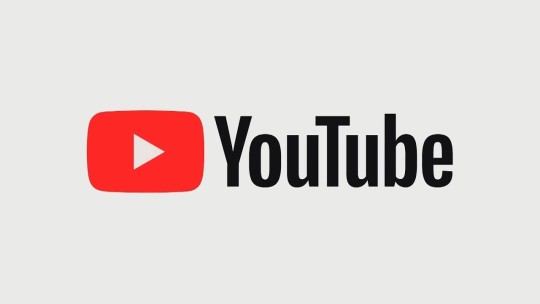
The Closer Look: While this channel is primarily dedicated to the story telling in movies that doesn’t mean you can’t translate a lot of these story telling mechanics into writing. The video in the link covers how to make a compelling villain with one of my favorite villains of the DC Universe, so give them a look.
Extra Credits: Just like the last entry, this one doesn’t have much to do with writing novels or fiction. Rather, Extra Credits covers game design a lot of the time. But they also cover how to write the stories for those games and offer some interesting insight. Couple this with their other segments Extra Sci Fi and Extra History, and you have the makings of an amazing tool kit for writers of any medium.
Overly Sarcastic Productions: There is not enough praise I can throw at this channel. Anything from Trope Talk to Miscellaneous Myths and even Classics Summarized is able offer something to even the most seasoned writer. Just like Extra Credits too, they also cover a bunch of historical stuff too. Which, as a history buff myself, is always a plus.
Tale Foundry: By now, i’m sure you’ve gotten the theme. All of these channels are amazing, but this one is more writing focused then the rest thus far. The channel dedicates itself to taking a closer look at genera and sub-genera and the big players therein. It gives the audience a chance to take a look at these things under the microscope for an easier means of dissection for their own work.
Hello Future Me: I found this channel when I was scrolling through YouTube randomly and found their video on Writing a Hard Magic System and it gave me plenty of food for thought on the fantasy novel I was working on. They go on to cover a Soft Magic System which was able to really draw the line in black and white as to the difference between the two. From there, the channel has been able to offer a few good videos on matters of writing fiction and one that comes with a recommendation for me.
PlagueOfGripes: This one, you’ll need to take with a grain of salt as the host is a little rough around the edges. While he primarily covers art streams and other shenanigans like that, he did a three part video essay on writing that had quite a bit to teach. I personally found his cynical nature to be charming and funny, but if that isn’t your thing, maybe pass him by just this once.
All the links to the channels are located in their respective titles.
7K notes
·
View notes
Text
Welcome to World Building June 2019!
It’s June 1st!
Time to start building! Whether you’re continuing from a world you’ve been working on last year, or you’ve got a fresh new world, or if this is your first year, I wish you all luck to work on that world as feverishly as possible!
Remember, even if you can’t work on your world every day of June, getting some work done every other day is still far more progress than what you’d have just sitting on your hands, so never feel discouraged, even if life/brain stuff tries to get in the way!
Also remember you can join other builders at our DISCORD!
112 notes
·
View notes
Text
Women have more power and agency in Shakespeare’s comedies than in his tragedies, and usually there are more of them with more speaking time, so I’m pretty sure what Shakespeare’s saying is “men ruin everything” because everyone fucking dies when men are in charge but when women are in charge you get married and live happily ever after
226K notes
·
View notes
Text
How I Wrote A Novel.
This, in a nutshell, is what I did to get a book with my name on it.
NOTE: This is just my personal way of making the words go. Other people have different ways to make their words go. In the world of words, there are no right answers. There’s just lots and lots of tea/coffee/tear stains.
1). The Idea
When I get an idea for a story, I open up a document, label it “Brainstorming,” and start making a bullet list of events that consist of the plot.

It has to be an idea with tangible weight. A stray bit of dialogue or something vague like Halloween, that doesn’t give me much to work off of. Halloween creatures living on the same street where it’s Autumn every day- now that’s something I can build from.
What kinds of creatures are they? What do they do? What do their houses look like? The best ideas are the ones that spark more.
2). First Draft

This is the easy part- and the most challenging. Easy, because there’s literally no bar. I just sat there and typed. But it’s a huge mental challenge.
When I was in first draft mode, I wanted that story out. I thought that by making it such a rough, far-away version from the concept in my head, I was only delaying the day where I’d hold it in my hands. Turns out, that’s what got it to take on physical form in the first place. So I quieted down, grabbed my laptop and some hot tea, and typed.
3). Dissecting the First Draft

After I finished draft one, I printed it all off and highlighted the scant amounts that were passable for the next phase. Dialogue, descriptions, setting- anything that didn’t look like it was up to par was scratched out and omitted.
I call the above pictures A Slow Descent Into Madness.
4). The Second Draft

On a fresh document, I rewrote the story altogether- and it make a difference. I was coming up with things I hadn’t even thought of previously. And it was surprising how much better the plot was than the first time around. But it was still rough.
5). Draft Three

My method was to start with the bigger, more obvious issues and work my way down. Any plot holes I found were noted, and my outline was constantly under revision. I cut out entire scenes and made mental notes on ways they could be fixed/replaced.
This is where I started cutting chapters in half to make the story flow better- but I didn’t bother writing in usable chapter titles. Instead, I improvised:
6). Drafts Four and Five

These were dedicated to correcting the smaller, less obvious plot holes. This was the point where the story finally started to look close to what would become the final version.
7). Drafts Seven Onward

With the story line looking how I wanted, I then moved on to sentence structure. That one song that looked terrible? Rewritten. Over-the-top descriptions and excessive prose? Gone.
8). Editing and Proofing
This is where I had outside help. Besides this useful tool, I had two people check for spelling issues and the overall story. Once it was in decent shape to be made public, I asked for some additional help.
9). Betas
My betas were in the age range that my novel was geared toward, along with a couple of teachers and parents (as it was middle grade). I gave them the full manuscript, along with seven basic questions like “Which characters were your favorite/least favorite and why?” and “Was there a part of the story that didn’t make sense?”
I gave my betas three months to read a 42,590 word story, and by the end they gave me back the review sheets.
10). Final Adjustments
After I read over the reviews, I let the comments sit for three days so that I could proceed with a clear head. I smoothed out any flaws, scanned over the MS twice to make sure everything was right, and that is how I got to the end of writing my first novel.
Next comes publishing- which is a different beast entirely.
27K notes
·
View notes


